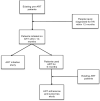Factors affecting optimal adherence to antiretroviral therapy and viral suppression amongst HIV-infected prisoners in South Ethiopia: a comparative cross-sectional study
- PMID: 35093100
- PMCID: PMC8800260
- DOI: 10.1186/s12981-022-00429-4
Factors affecting optimal adherence to antiretroviral therapy and viral suppression amongst HIV-infected prisoners in South Ethiopia: a comparative cross-sectional study
Abstract
Background: Maintaining optimal adherence and viral suppression in people living with HIV (PLWH) is essential to ensure both preventative and therapeutic benefits of antiretroviral therapy (ART). Prisoners bear a particularly high burden of HIV infection and are highly likely to transmit to others during and after incarceration. However, the level of treatment adherence and viral suppression in incarcerated populations in low-income countries is unknown. This study aimed to determine factors affecting optimal adherence to antiretroviral therapy and viral suppression amongst HIV-infected prisoners in South Ethiopia.
Methods: A comparative cross-sectional study was conducted between June 1, 2019 and May 31, 2020 to compare the level of adherence and viral suppression between incarcerated and non-incarcerated PLWH. Patient information including demographic, socio-economic, behavioral, and incarceration-related characteristics were collected using a structured questionnaire. Medication adherence was assessed according to self-report and pharmacy refill. Plasma viral load measurements undertaken within the study period were prospectively extracted to determine viral suppression. Univariate and multivariate logistic and fractional regression models were used to analyse data.
Results: Seventy-four inmates living with HIV (ILWH) and 296 non-incarcerated PLWH participated in the study. While ILWH had a significantly higher pharmacy refill adherence compared to non-incarcerated PLWH (89 vs 75%), they had a slightly lower dose adherence (81% vs 83%). The prevalence of viral non-suppression was also slightly higher in ILWH (6.0%; 95% confidence interval (CI): 1.7-14.6%) compared to non-incarcerated PLWH (4.5%; 95%CI: 2.4-7.5%). Overall, missing ART appointments, dissatisfaction with ART services, inability to comply with a specified medication schedule, and types of methods used to monitor the schedule (e.g., news time on radio/TV or other social cues) were significantly associated with non-adherence according to self-report. In ILWH specifically, accessing ART services from a hospital, inability to properly attend clinic appointments, depressive symptoms, and lack of social support predicted NA. Viral non-suppression was significantly higher in males, people of age 31to 35 years and in those who experienced social stigma, regardless of their incarceration status.
Conclusions: Sub-optimal dose adherence and viral suppression are generally higher in HIV-infected prisoners in South Ethiopia compared to their non-incarcerated counterparts. A multitude of factors were found to be responsible for this requiring multilevel intervention strategies focusing on the specific needs of prisoners.
Keywords: Adherence; Antiretroviral therapy; Incarceration; South Ethiopia; Viral suppression.
© 2022. The Author(s).
Conflict of interest statement
The authors declare that they have no competing interests.
Similar articles
-
Imprisonment for South Ethiopian people living with HIV presents a double health burden: lived experiences of prisoners.BMC Health Serv Res. 2024 Jan 22;24(1):122. doi: 10.1186/s12913-024-10587-y. BMC Health Serv Res. 2024. PMID: 38254096 Free PMC article.
-
Various structural factors influenced early antiretroviral therapy initiation amongst HIV infected prisoners: a qualitative exploration in South Ethiopia.BMC Public Health. 2021 Jul 28;21(1):1463. doi: 10.1186/s12889-021-11499-w. BMC Public Health. 2021. PMID: 34320958 Free PMC article.
-
A systematic review and meta-analyses on initiation, adherence and outcomes of antiretroviral therapy in incarcerated people.PLoS One. 2020 May 18;15(5):e0233355. doi: 10.1371/journal.pone.0233355. eCollection 2020. PLoS One. 2020. PMID: 32421754 Free PMC article.
-
Facilitators and Barriers to adherence to antiretroviral therapy among incarcerated people living with HIV in Iran: insights from a qualitative study.Harm Reduct J. 2025 Jan 8;22(1):4. doi: 10.1186/s12954-024-01151-2. Harm Reduct J. 2025. PMID: 39773185 Free PMC article.
-
Alcohol Use and Antiretroviral Therapy Non-Adherence Among Adults Living with HIV/AIDS in Sub-Saharan Africa: A Systematic Review and Meta-Analysis.AIDS Behav. 2020 Jun;24(6):1727-1742. doi: 10.1007/s10461-019-02716-0. AIDS Behav. 2020. PMID: 31673913 Free PMC article.
Cited by
-
Non-Adherence to Anti-Retroviral Therapy Among Adult People Living with HIV in Ethiopia: Systematic Review and Meta-Analysis.AIDS Behav. 2024 Feb;28(2):609-624. doi: 10.1007/s10461-023-04252-4. Epub 2023 Dec 29. AIDS Behav. 2024. PMID: 38157133 Free PMC article.
-
Virological failure and associated factors among patients receiving anti-retroviral therapy in Ethiopia: A systematic review and meta-analysis.BMJ Open. 2024 Nov 28;14(11):e087569. doi: 10.1136/bmjopen-2024-087569. BMJ Open. 2024. PMID: 39613423 Free PMC article.
-
HIV viral suppression in the era of dolutegravir use: Findings from a national survey in Tanzania.PLoS One. 2024 Aug 14;19(8):e0307003. doi: 10.1371/journal.pone.0307003. eCollection 2024. PLoS One. 2024. PMID: 39141647 Free PMC article.
-
Unravelling the experiences of incarcerated individuals living with HIV on ART: a qualitative study in Ghanaian prisons.Int J Prison Health (2024). 2024 May 29;20(2):186-199. doi: 10.1108/IJOPH-06-2023-0031. Int J Prison Health (2024). 2024. PMID: 38984601 Free PMC article.
-
Identifying longitudinal patterns of HIV treatment (dis)engagement and re-engagement from oral histories of virologically unsuppressed persons in Uganda: A thematic trajectory analysis.Soc Sci Med. 2023 Dec;339:116386. doi: 10.1016/j.socscimed.2023.116386. Epub 2023 Nov 14. Soc Sci Med. 2023. PMID: 37984182 Free PMC article.
References
-
- Joint United Nations Programme on HIV/AIDS (UNAIDS) Data for 2020. Geneva: UNAIDS; 2020. - PubMed
-
- United Nations Office on Drugs and Crime (UNODC). HIV and AIDS Prevention, Care, Treatment Support in Prison Settings sub-Saharan Africa: Final Project Report (2017) Pretoria: UNODC; 2017.
MeSH terms
LinkOut - more resources
Full Text Sources
Medical


